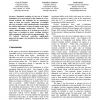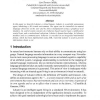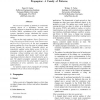2650 search results - page 27 / 530 » Simulation and Control of Reactive Systems |
145
Voted
RSP
2007
IEEE
15 years 9 months ago
2007
IEEE
This paper addresses the need for formal specification and runtime verification of system-level requirements of distributed reactive systems. It describes a formalism for specifyi...
139
Voted
CEC
2005
IEEE
15 years 4 months ago
2005
IEEE
Simulated evolution by the use of Genetic Algorithms (GA) is presented as the solution to a twofaceted problem: the challenge for an autonomous agent to learn the reactive componen...
106
Voted
LDVF
2000
15 years 2 months ago
2000
In this paper we describe Lokutor, a virtual human. Lokutor is a partially autonomous agent, inhabiting a 3D virtual environment. The agent can be controlled via natural language ...
126
Voted
TOOLS
1997
IEEE
15 years 7 months ago
1997
IEEE
PROPAGATOR is a family of patterns for consistently updating objects in a dependency network. The propagator patterns are found in such diverse applications as MAKE, WWW, spreadsh...
119
Voted
NIPS
2001
15 years 4 months ago
2001
Policy gradient methods for reinforcement learning avoid some of the undesirable properties of the value function approaches, such as policy degradation (Baxter and Bartlett, 2001...



